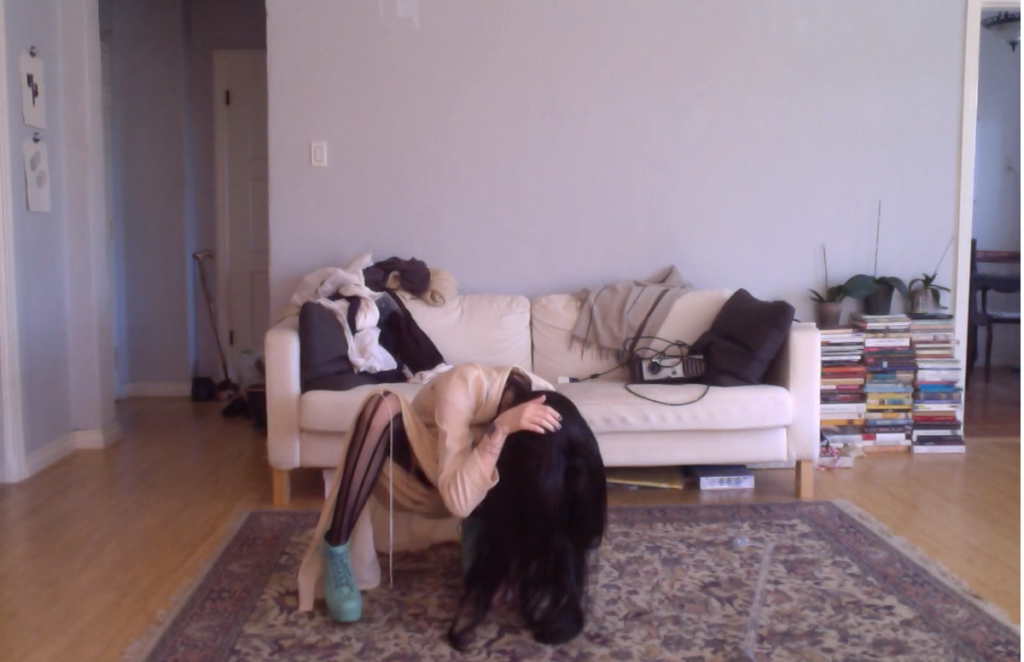
This essay was first made available last month, exclusively for our Patreon supporters. If you want to support Full Stop’s original literary criticism, please consider becoming a Patreon supporter.
You need to be a big girl about this, the doctor says to me when I tell her I’m not sure about the pills. I have been in monthly debilitating pain, and the prevailing and first wisdom is that birth control is the answer. But birth control fucked me up in all sorts of ways for the first 20 years of my fertile life, and I want to try other things first for my pain.
I’d like to hold off on hormones for now, I tell my doctor.
My doctor shakes her head. Are you refusing treatment? Her hands poised above the keyboard.
(She used to like me, I tell a friend later, but now that I said no to the pills I am the bad kid.)
I try to ask a question about my combination of pain medications, if there is anything I need to be careful with, but she is done with me already, ushering me out.
Being all-natural is all very nice and good, my doctor says as she shoves the EXIT door for me. She shakes her head, but there comes a point when you need to take charge.
//
I want to take charge, but I don’t know what that means. I suppose I will know it if it makes me get better, if I am able to find and pull the right trigger to master the pains and problems of my body. This is what it means to be productive while ill: no work counts until the ends of the means are met. Until I possess conclusion, I am not working enough.
“Self-possession and self-mastery are the most legible and preferred forms of selfhood within a society built upon the ideology of possession,” writes Johanna Hedva. Hedva is an artist, writer and musician whose essay “Sick Woman Theory” gestures at the narrowness and restrictions of the options for political engagement available to sick and disabled bodies. But in the essay I’m quoting here, “In Defense of De-Persons,” Hedva revises and builds upon the thinking of “Sick Woman Theory” to consider the political potential within the diagnosis of “de-personalization,” one that Hedva themself has received. Hedva argues that the state itself creates “de-personalization,” but then demands that the individual hold complete responsibility for their individual maintenance and, as above, display “mastery” of themselves.
I turn to Hedva for a more specialized kind of taking charge: the taking charge of the ideology that blankets me in moments of so-called “medical management.” In reading Hedva, I gain a bit more understanding of why I think I’m meant to figure this out myself, why it’s demanded that I possess whatever has possessed me: that I take charge.
I feel the defense of theory rise around me. I want to call it “armor,” or “weapon,” but I am trying not to meet violence with violence. What is a structure to protect from force if not a defense, if not a rigid place? I think of my friend Arisa, who has known she has endometriosis for so much longer than I have, and so has strategies and knowledge that I don’t.
Sometimes you just have to tell the doctors no and put together your own treatment plan, she tells me, They can’t legally force you to do what they want.
Do I take charge, then, by treating my disobedient body with pills – or does taking charge mean standing up to my doctors and refusing what they’re offering? When my limbs are stiff and my muscles weak with pain, it can be hard to even understand what the doctors are saying, let alone parse the world of self-help, herbal treatments, and alternative medicine that I dip into on the internet.
“For consent to treatment or refusal of treatment to be valid, the decision must be voluntary and you must be appropriately informed,” reads one website defining patients’ rights.
Appropriately informed: I will read you your rights. No one must be handcuffed into a treatment decision. Information swells around me and presses in. I feel panicked that I will not be able to appropriately let it all in.
//
Julia explains to me how she’s organizing with her neighbors so that no one calls the police on each other, a self-regulatory strategy to combat police violence in Oakland.
We put up posters around places where the cops usually hang out, she tells me, pretty letters on stationary that say, “Dear police, thanks for your service, but we’re taking charge now.” We’re trying to communicate that we’ve tried their way but we’re no longer interested.
Is this what makes refusal truly voluntary? Having tried the offered alternative and understanding that it does not serve you?
I think of my grandmother serving me a food she knows I don’t like and saying, you’ve got to take at least a no-thank-you-portion. Must we take a no-thank-you-portion of police?
I long for the no-thank-you-portion as a patient: to engage with doctors but not be obligated because of it, not be obligated to complete or follow all of a proscribed path. I want the ambivalent place that still has the integrity of listening.
“I keep saying I don’t know. It seems important. When so many around me claim to,” writes Stephanie Young in Ursula or University, her book of hybrid prose-ish poems invoking community under threat of environmental disaster and oppressive social conditions. By both inscribing the boundaries of a community in time and space and gesturing toward her hope to work as a traitor against exclusive structures, Young holds a position of authority and at the same time, attempts to deflect it. She continues: “So many books diagnose conditions. So many posts claim what is to be done. With a trail of comments to argue the finer points. While the conditions keep repeating, proliferate. Where so little changes, I don’t know, it seems important.”
//
Over the years, many friends have sent me Lena Dunham’s editorial in which she argues that birth control is a health necessity for people who live with endometriosis. She writes:
…I am one of the lucky ones. I can continue to do my job as a writer and a director, work directly with doctors to ensure my disease is controlled, and feel the support of millions when I am let down by my own body.
I don’t know, Stephanie says, She annoys me, but she has a point. Years ago I read Stephanie’s book, and then she was Stephanie Young to me, but now we have become friends, and so here she is Stephanie, first name casually like I’ve learned to do from the New Narrative writers to whom she and I both owe much of our aesthetic and literary community, who gave us permission to cede our bodies into the writing. Stephanie and I became friends when we both started to write about cysts bursting, about emergency room visits, and mutual friends at both of our readings began to tell us we were circling these things together. We became friends over years when we both guessed we had endo, were charged $650 for ultrasound after ultrasound and told to “keep an eye on it,” and then eventually the year when we were both diagnosed with this thing.
I don’t know, Stephanie is good at starting her sentences this way. We are sitting in the park the summer we both have surgery, she a month out and me less than two weeks. Her I don’t know comforts me as I can barely sit up straight on the bench, and the post-surgery pain meds make my attention drift in and out. If she doesn’t know, maybe also I don’t have to.
The problem with Lena is that she makes it seem sure, Stephanie says. Neither Stephanie nor I had a hysterectomy during this surgery, but we’re not sure; maybe we will need one in the future.
In her editorial, Dunham’s prose is direct, uncluttered, able “to do my job.” In the face of losing coverage for birth control, she turns down the dial on her goofy persona and writes a clear, concise, even dry argument. She does not jiggle or waver.
“Nothing is more punitive than to give a disease a meaning,” writes Susan Sontag, “that meaning being invariably a moralistic one.” It’s not the moralism itself that’s the problem, for me, but the rhetorical strategy it emphasizes. I stand with all of those fighting for a right to health care in this moment—or, rather, I do not “stand” with them because of the ableism inherit in this phrase, but I place my own body in this mass, asserting this tremendous need. I respect Dunham for massing here, too, for using her celebrity position to make the case for people getting the treatment they require. But I also want there to be a way for this massing to live alongside rhetorical and literal options, to avoid the language of defeating the pain or buckling down. To my mind, the fight for healthcare is not actually accurately characterized as a fight – to, again, parse closely the language. Far more basic than a fight, the assertion of this right is itself a foundation.
//
Dunham’s piece is years behind us now, and – perhaps building upon it, thanks to it – new ways of speaking with illness and pain are proliferating. These texts open up the options I search for: the jiggle, the whine, the ambivalence about pain killers and hormones get to stay in the room. My friend Avery reminds me that ambivalence means of both valences, as in two elemental powers, chemically tugging in multiple directions. Ambivalence seems less flighty defined this way, with the scientific backing of electrons chemically bonded, pulling and pulling again. I feel this pull inside the force of Caren Beilin’s 2019 book Blackfishing the IUD, in which she describes her medical nightmare with the copper IUD, resulting in rheumatoid arthritis, and entree into the back-door, gossipy (in her own words), secreted narratives of chronic gendered illness. Beilin collects the stories of many others alongside her own, along with the kinds of folk knowledge and internet-knowledge that are created by those of us in medical limbo, in total despair of certainty.
Beilin opens with a consideration of collecting and owning books, and through them gaining the capacity to perform and/or possess knowledge. It is a fitting opening for a citational book that reads through multiple urgent compulsions at once. Beilin writes:
I have thought that to collect, to purchase, is to own, but that to read is to save, if it is to preserve the tremoring, the forevering gerund, of what was said, and said, a gelatinous threading, saved in the seas of present consciousness.
What if instead of searching for the correct way to take charge of medical information, we were to understand illness with this forevering? Beilin threads her own practice further: her book is accompanied by a podcast in which Beilin interviews people about reproductive healthcare and the medical industry. In the first episode I struggle to tell the difference between Beilin’s voice and the voice of the person she is interviewing, which seems actually appropriate, ambi-valent, the two voices threading as they pull against one another, even when they feel differently about something or disagree. This aggregation of opinion and selfhood assembles insight, rather than competing for it. Beilin refuses the utility of the simple story for a massed accounting that builds furiously in the book and then further in the podcast. Its heaping form invokes the undisciplined ordeal of physical swelling, as Beilin writes: “Inflammation is protection that came out wrong, like saying it wrong, like writing too long or the wrong book. It’s hard to stop it.”
//
Joanna Hedva calls their video “Sick Witch, 2016” the “performance id” to the theoretical work they’ve done with Sick Woman Theory. In it Hedva in front of a white couch. The video opens with Hedva completely bent over, moaning. Throughout the video Hedva makes noises that seem to indicate pain, but also, “wobbles, regurgitates bullshit people have told her to do,” including voices saying, “have you tried exercising more?” and “Have you tried Vitamin B?”
After listing what sounds like a drug’s potential side effects while clutching herself and the air, Hedva blurts: “You must remember! – your doctor – has chosen – to prescribe you – this medication – because its benefits! – outweigh-ay-ay-ahhh – its side effects.” They bend again to their knees and gather their long dress to their crotch, then continue, bobbing: “Do not operate heavy machinery …or perform any tasks that require alertness…focus…or concentration.” They whip their arms apart and the video ends.
In its way Hedva’s video reads as a no-thank you portion of prescribed medicine. As a viewer I assume they are taking this medication, potentially experiencing some of its side effects. They display the narratives of their doctor(s) on their skin, but also do not swallow them completely. The performance is the no-thank you portion: I take what you give me but I take charge in the way I will.
//
Anne Boyer’s 2019 book, The Undying, has also been broadly received as a no-thank you portion. Boyer is treated for breast cancer throughout (and after) the course of the book, but, like Beilin, even while detailing her treatment Boyer refuses the traditional illness narrative of a happy ending or pathetic fade-away. Instead, she interrogates the experience of ongoing illness for what content it might contain that is woven with capitalism, surveillance, and the political and economic utility of the sick body. Boyer writes:
What will be the outcome of this illness? resembles the questions asked by detectives, art collectors, and graphologists, or anyone who moves some unobvious incidental detail into the heart of a story. Enchantment exists when things are themselves and not their uses. That’s why enchantment begins to fade the moment we believe that a collection of cells can predict the agonies of next June.
What I respect most in work like that of Boyer, Hedva, and Beilin is that they back away from utility while still developing new thinking. It is thinking that grows indirectly in relationship to productive ends. It is an enchanted thinking that stays within experience, and that may conflict with, or refuse taking charge in a normative sense. Only in this enchanted light can we see an actual body.
//
“I hate all details of the individual life,” writes Virginia Woolf in The Waves, “But I am fixed here to listen.”
I love this “fixed” with its duality – fixed meaning placed or stayed, and also, at the same time, improved. An enchanted co-existence of state and process. As I write this, I feel a sense of listening, a kind of conglomeration that allows me to continue to parse these writers, even through the kind of brain fog that comes with certain pain medicines or long days in bed with pain.
I imagine Woolf as herself a lifelong Sick Witch, to use Hedva’s term. I extend it here to mean people identified with being sick and continuing to generate knowledge as they think in company with this state of being that threatens to eliminate precisely the capacity to think. Woolf was diagnosed with various things that these days we refer to as Bipolar II disorder – fixed, as she was, in the garden, in the sick room. In Heroines, a book about the wives of famous literary modernist men who were diagnosed as hysteric or mentally ill, Kate Zambreno writes that Woolf was commanded by one of her doctors to treat her illness by gardening for four hours a day and cooking for an additional four, with the conviction that traditional domesticity would cure her. She was not permitted to write more than one hour a day.
I imagine Woolf hating the life that passed before her in these jailed moments, but remaining committed to listening for the details of the moments themselves. As Boyer does, when she alchemizes her experience of cancer into poetics, but in a book that in its form and politics works to avoid the profitability of transformation or predictive technology. Boyer uses her illness, but does not make it submit to her, or us. It continues to twist, rhizomatic, and take in the varities of light Boyer holds it against.
And as Beilin does, porous to the stories of others, a gathering snowball of icy revelation about the realities and dangers of the IUD. Her illness becomes a methodology as opposed to something inviting solution. Beilin works toward a political speech that includes the foundation of the right to access health care, but requests even more than this. Such speech requests a capacity to generate one’s own medical narrative, too, to validate the ways in which different subject positions experience a body and to attempt a discourse that does not subjugate any of these.
I keep coming back to Woolf, though she is also an imperfect narrator who meets the experience of illness from a variety of financial and cultural privileges that she does not necessarily address in her work. I keep coming back to her because of the position of cumulation she animates in me, how she uses her confinement periods as time to absorb the language and characters around her, to absorb medical speech into her work. I starting writing this essay long before the COVID-19 pandemic, but the last few months have found us with much more widespread experience of what it means to be confined. I have watched many of my favorite disabled and sick artists and writers post about their hopes that one result of broadscale quarantines will mean a broader understanding of creativity with/in restriction. Each of our individual experiences of this time are specific to our positions. But my hope is that for those who never endured some kind of forced confinement prior to shelter-in-place, a new stance might be acknowledged, even required.
“But I am fixed here to listen,” Woolf writes. Though she’s often referred to as the patron saint of shut-ins, I don’t think this phrase works. Because speech does not have to shut us in. Actually and instead, it forces us to reconsider the permeable states of our bodies, the ever-present potential risks of gaze and language and body. My hope is that we take a stance at the window, making our confinement a way to look out.
Leora Fridman is a writer whose work is concerned with issues of identity, assimilation, care, ability, and embodiment. She’s author of My Fault, selected by Eileen Myles for the Cleveland State University Press First Book Prize, in addition to other books of prose, poetry and translation. She was a 2019-2020 Fulbright research fellow to Mexico. More at leorafridman.com.
This post may contain affiliate links.







